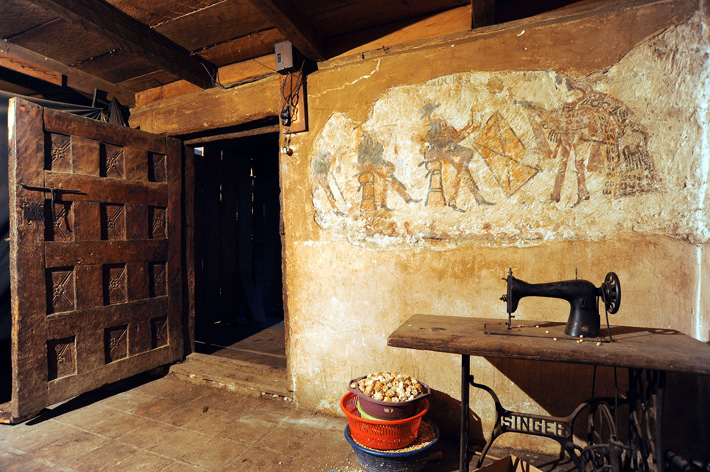Anthropology
Related: About this forum15th-Century Mayan Artwork Discovered Inside House Walls During Renovations

By Madison Dapcevich
09 JUN 2020 00:01
Renovations of a mudbrick house in Guatemala has revealed a set of “remarkable” Mayan wall art that may represent “lost” dances typical of the culture during the Colonial period.
Today, the Maya population is estimated at around 8 million, most of whom live in Guatemala. Many Ixil Mayans live in the southcentral region and city of Chajul, where their homes are believed to date back to the Colonial period when the Spanish ruled the region. Typical artwork of the era depicts Christian subjects and served as a way for the colonizing Spanish to assert control, but the discovery of traditional indigenous style artwork during this timeframe indicates there may have been a revival as Spanish power waned.
The artwork was first discovered in a mudbrick house by the homeowner in 2003. Publishing their findings in Antiquity, an international team of researchers collaborated with local Ixil Maya to analyze and restore the paintings, which extend around three walls of the central room in the house known as “house 3”. The artwork shares many similarities with pre-Hispanic Maya art and was likely painted using traditional methods.

Antiquity
Radiocarbon dating of the walls and pigments used suggest the artwork dates between 1524 and 1821 AD, though pinpointing the exact date is difficult as the mural had been repainted several times and covered over with paint at least five.
More:
https://www.iflscience.com/editors-blog/15thcentury-mayan-artwork-discovered-inside-house-walls-during-renovations/
Judi Lynn
(163,734 posts)OCTOBER 12, 2012 / 4:06 AM / 8 YEARS AGO
In humble home, Guatemala farmer finds ancient Maya murals under plaster
Mike McDonald
5 MIN READ
CHAJUL, Guatemala (Reuters) - In a ramshackle home in Guatemala’s rural highlands, farmer and odd job man Lucas Asicona made for an unlikely guardian of ancient Mayan treasures - until he decided to redo his kitchen.
When he pulled back the plaster in his humble colonial-era home of stone, adobe and haphazard wooden boards, he discovered 300-year-old murals, a priceless piece of Guatemalan history.
Scenes of tall Europeans beating drums and playing flutes stare out over the one-room dwelling where his family including five children cooked, slept and played.
So he carefully drew back the furniture and moved his wood burning kitchen stove outside to protect the treasured artwork, an informal curator of Guatemala’s rich past.
“We try to keep the kids away from it and keep people from touching it,” said Asicona, 38, who discovered the murals by chance in 2005 during renovation work at his home, which has been in his family for generations.
“The house is very humid and some of the colours have been fading. The black has started to turn gray and some of the other colours have lost their shine, but we do what we can without any funding,” he added.
Asicona is among four householders in Chajul, an Ixil Maya community some 220 miles (350 kms) from Guatemala City, struggling to preserve murals revealed after peeling back plaster on the walls of ancient homes. Experts believe similar murals could lie hidden in a further eight homes in the town.
More:
https://www.reuters.com/article/uk-guatemala-murals/in-humble-home-guatemala-farmer-finds-ancient-maya-murals-under-plaster-idUSLNE89B00R20121012
Judi Lynn
(163,734 posts)By ZACH ZORICH
January/February 2013

chajul-maya-mural.jpg(Courtesy Robert Slabonski)
Lucas Asicona Ramírez
(Courtesy Robert Slabonski)
Lucas Asicona Ramírez probably had no idea that he was embarking on an archaeological excavation five years ago when he began scraping down the plaster on the walls of his 300-year-old home in Chajul, Guatemala. But his renovation uncovered a series of murals that had been painted by his Ixil Maya ancestors in the years after the Spanish conquest. Some of the paintings depict what archaeologists Lars Frühsorge, Jarosław Źrałka, and William Saturno believe to be a ritual called the Dance of Conquest. The people in this painting seem to be Maya, yet wear some pieces of European clothing. The seated figures are playing instruments while the figure on the right, wearing a jaguar skin and cape, dances.
https://www.archaeology.org/issues/60-1301/trenches/314-chajul-guatemala-dance-conquest